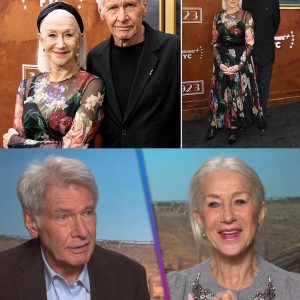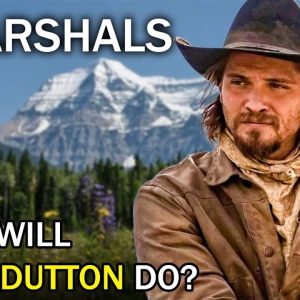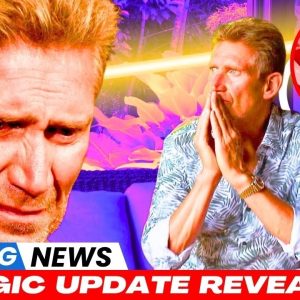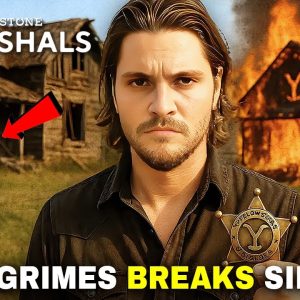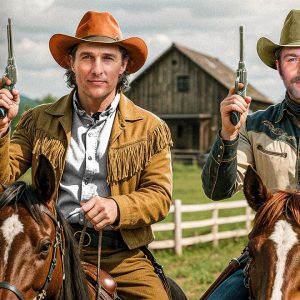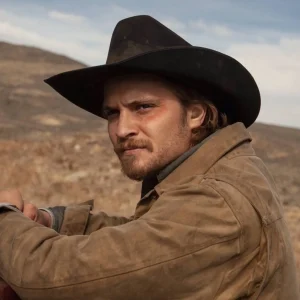“Yellowstone” isn’t just a television show—it’s a cultural lightning rod, a gritty western opera that has captivated millions with its blend of sweeping landscapes, political power plays, and emotionally volatile characters. But in a surprising twist, even its creator, Taylor Sheridan, is now peeling back the curtain—and what lies behind it is more chaotic and revealing than many of the show’s own plot twists.
In a recent brutally honest interview, Sheridan didn’t hold back. Not only did he admit that Yellowstone is “nonsensical,” but he also declared his deep dissatisfaction with the show’s ending, calling it something he hates. For a series that built itself around family loyalty, ranchland warfare, and raw frontier justice, this kind of creator confession adds another layer of drama—one that may reshape how fans understand the journey they’ve been on for the past five seasons.
A “Horse Opera” with No Apologies
Sheridan has always approached storytelling with rebellion in his veins. But calling his own show a “horse opera” that “makes no sense and isn’t trying to” feels like a gut punch to fans who’ve emotionally invested in every Dutton tragedy and triumph. The term itself—coined by writer Gretel Ehrlich—speaks to a genre-bending narrative that often sacrifices logic for emotional punch, cinematic spectacle, and character-driven drama. Sheridan’s response? Total acceptance. “It’s a window into a world,” he said. “Yellowstone is punk rock. It’s both middle fingers to television conventions.”
For those who’ve ever sat stunned after a twist—Beth setting an office on fire, Jamie’s murder plot, or a violent ambush in the middle of Montana—this comment might explain a lot. The show’s unpredictable arcs weren’t always rooted in clean storytelling. Sometimes, they were driven purely by raw instinct, designed to reflect the Duttons’ unrelenting grip on power, land, and legacy.
And yet, that “messiness” is what made it impossible to look away.
Season 3: The Breaking Point
Sheridan also revealed a pivotal turning point in the show’s development—Season 3. To many viewers, it was a high point. Tensions boiled between Beth and Jamie, Kayce straddled the line between political authority and cowboy bloodline, and John Dutton’s hold on the Yellowstone ranch felt increasingly threatened. But behind the scenes, things were falling apart.
According to Sheridan, Season 3 was nearly a creative disaster—because he wasn’t writing it. “They tried to hire a writers’ room,” he said. “The scripts were so bad the actors mutinied.” Sheridan was directing a film in New Mexico when he got the call to salvage the season. And so, he stepped in—writing an episode every Saturday under pressure, fueled by sheer grit.
Whether or not you believe Season 3 needed saving, what’s undeniable is Sheridan’s devotion. Even while criticizing the show’s structure, he remained obsessed with making it work. This contradiction defines Yellowstone: chaotic but committed, messy but magnetic.
Breaking the Rules—and Thriving
There’s a certain charm to Sheridan’s candor. He doesn’t pretend Yellowstone was ever meant to be tidy or polished. Instead, he proudly embraces its raw, rule-breaking energy. “It breaks so many storytelling rules,” he said, describing the show as “part pandering, part horse porn at sunset, and part Benny Hill.”
That line is both hilarious and bizarrely accurate. One moment, the show immerses you in the majestic romance of riding a horse across a sunrise-painted prairie; the next, someone’s being blackmailed, shot, or thrown off a cliff. And yet, it all somehow works—because Sheridan was tapping into something deeply American: freedom, rebellion, and the complicated relationships we have with legacy, violence, and love.
Even as he pokes fun at the genre, Sheridan expresses a near-religious reverence for the world he created. “I think it’s divine,” he said. “It’s as close to religion as anything I’ve ever experienced.” That spiritual connection shines through in scenes where characters aren’t speaking—just riding, herding, grieving, or staring out into the Montana horizon.
Sheridan’s writing process is just as emotionally charged. In one vivid memory, he described pouring out half a script in four and a half hours without realizing his wife was standing over him. That kind of trance-like immersion speaks to a creator utterly consumed by his vision, flaws and all.
Fallout and Fractures: The End of an Era?
But as with many epics, Yellowstone has begun to unravel under the weight of its own legend. Kevin Costner’s feud with production, rumored delays, and uncertainty surrounding the show’s conclusion have all chipped away at its once-indomitable stature. Even Sheridan, now knee-deep in other projects like 1923 and Tulsa King, seems emotionally detached from preserving the Dutton legacy.
“Maybe I never intended to,” he mused. “I just don’t think I’m that unique. If something’s interesting to me, it’s probably going to be interesting to a lot of other people.”
That humility—bordering on indifference—may be the most telling revelation of all. For fans still mourning the lack of closure, it’s hard to accept that Yellowstone might never get the grand sendoff it deserves. But maybe that’s the point. The show was never about neat endings. It was about chaos, passion, and survival.
Where Do We Go From Here?
So, what does this all mean for the millions of fans who’ve stood by the Duttons—through cattle wars, kidnappings, land grabs, and emotional heartbreaks?
It means Yellowstone was never meant to be perfect. It was meant to feel—wildly, deeply, and unapologetically. It was about experiencing power, legacy, loyalty, and loss in their most extreme, operatic forms. Taylor Sheridan didn’t aim to tie everything in a bow; he aimed to rip the bow apart and make you keep watching anyway.
And somehow, that’s exactly what we did.
For all its flaws, Yellowstone created a universe that reshaped television—and even now, in the wake of its uncertain finale, it continues to stir conversation, debate, and devotion.
Maybe that’s the legacy Taylor Sheridan always intended: not perfection, but passion.
For more weekly updates and deep dives into the Yellowstone universe and Taylor Sheridan’s ever-expanding frontier, follow [YourNameHere]. The saga continues—maybe not on the screen, but certainly in our hearts and conversations.
